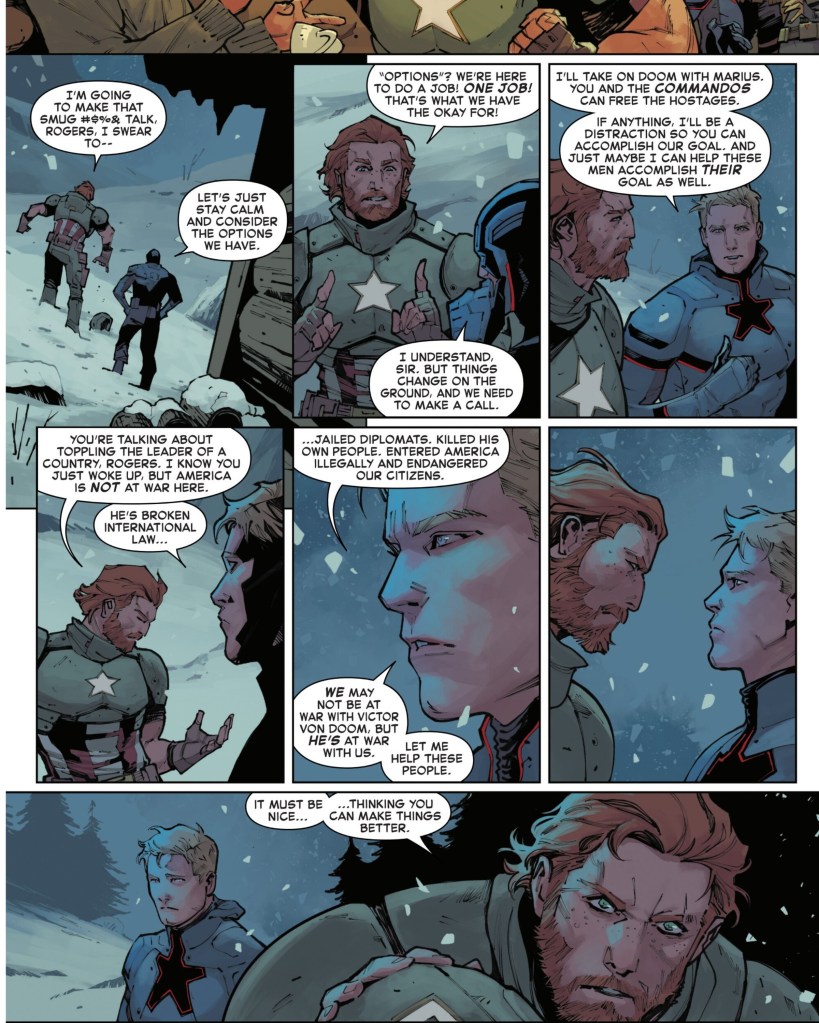Captain America, Steve Rogers, has long stood as the shining beacon of human potential, not just physically, but morally. His unwavering integrity and selfless courage are as iconic as his shield. Yet, in Chip Zdarsky’s Captain America #2, a glaring truth is told about what really defines the hero, and by extension, what constitutes his greatest “weakness” in a world that often prioritizes brute force. This issue masterfully contrasts Steve Rogers with his contemporary 2025 “replacement,” David Colton, revealing that the very qualities Dr. Abraham Erskine sought to instill in his Super-Soldier — a good heart and a pure spirit — are both Captain America’s defining strength and, paradoxically, his most vulnerable point in a cynical world.
Videos by ComicBook.com
The comic doesn’t just tell us Erskine was right; it shows us, through the stark differences between two men who carry the shield.
A Pure Heart Cannot Be Manufactured, Only Chosen

The distinction between Steve Rogers and David Colton is could not be more evident, even before their differing philosophies fully unfold on the page. Colton embodies a certain type of modern military mindset: cocky, quick to declare victory, and seemingly driven by a superficial understanding of “freedom.” His eagerness to move out into conflcit, his celebratory tone regarding military “gains” and “wins” in Kabul and Kandahar, and his dismissive attitude towards the seasoned wisdom of Qasim, an Afghan who has lived through decades of conflict, paint a picture of a leader who values immediate results over deeper understanding. In the midst of battle with Qasim’s attacker, Colton even exclaims: “Dammit, how do you not love this?” implying a degree of bloodlust and a lack of nuanced perspective that makes him unstable and an unreliable successor to Captain America’s legacy. He is a soldier, certainly, but one whose judgment is clouded by an almost aggressive optimism and a thirst for definitive, visible victories.
Steve, on the other hand, is the polar opposite of Colton’s impulsiveness. Even in the heat of battle or the aftermath of what appears to be a triumph, Steve remains cool, collected, and rational. He does not let his guard down, always assessing a situation in real time. His internal monologue reveals a man deeply troubled by the state of this new world in which he woke, questioning whether the freedom achieved through military might and constant surveillance is truly freedom at all. He listens to Qasim, acknowledging the veteran’s wise insight that “violence can give you the illusion of victory, but democracy is a much longer road.”
This humility, this capacity for empathy and critical self-reflection, is Steve’s true power. It allows him to analyze situations thoughtfully, not just as a mindless soldier following orders, but as a leader committed to minimizing casualties and ensuring genuine, lasting peace, not just a temporary cessation of hostilities. This inherent goodness, this pure heart, is something that cannot be replicated by any serum or training; it is a fundamental aspect of Steve Rogers’ character that Dr. Erskine always knew was the key to finding the perfect Super-Soldier.
The Man Out of Time Holds a Mirror to the Present

Steve Rogers, the “man out of time,” serves a crucial purpose in Zdarsky’s Captain America: he acts as a moral mirror, reflecting the uncomfortable truths of contemporary geopolitics, particularly concerning military intervention and destablization of foreign governments. While Colton represents the modern soldier, perhaps desensitized to the long-term consequences of conflict and viewing regions like the Middle East as mere strategic points on a global chessboard, Steve sees the human cost. He questions the sheer amount of military bases worldwide and the pervasive surveillance, recognizing that “a world sprinkled with our military might…our eyes are always watching” is not the America he fought and “died” for. His internal struggle — “We won. What I did mattered. So why do those words [Colton’s] haunt me? Is this what freedom means now?” — shows that Steve knows inherently that the military structure as a whole is wrong and he refuses to be a mere piece on that chessboard.
This refusal is brought to a head in his confrontation with what he thinks is Doctor Doom. Unlike Colton, who most likely would have charged in with brute force, Steve’s approach is strategic and rational. He prioritizes getting Reed Richards’ device on Doom to shut down his armor, demonstrating a tactical mind that seeks to neutralize threats efficiently and with minimal collateral damage, rather than simply engaging in a destructive brawl. Though the Doom in question turns out to be a repurposed Doombot, Steve’s careful, measured response, born from a desire to protect and preserve, contrasts sharply with the “foolish, impetuous” nature Doom attributes to Americans (a likely jab at Colton’s aggression).
Dr. Erskine’s belief that the Super-Soldier serum would amplify a man’s existing qualities — making a good man great, and a bad man worse — is proven true through Steve. His “weakness” is his inability to compromise his ideals, to become a detached instrument of state power. This unyielding moral compass, this pure heart, is precisely what makes him Captain America, and it is why Dr. Erskine’s vision remains eternally relevant.









